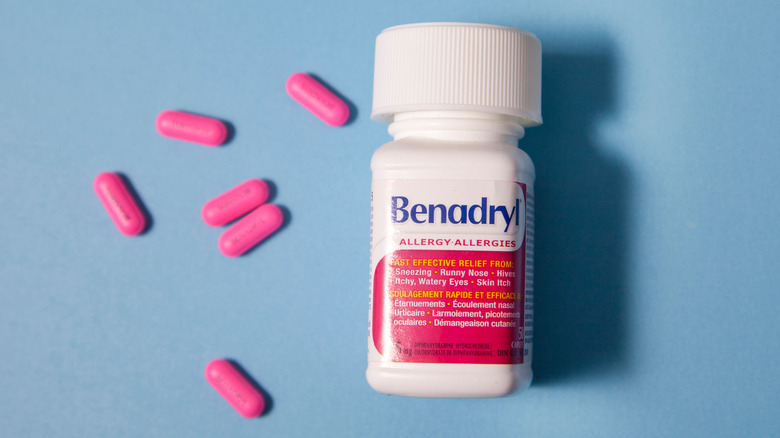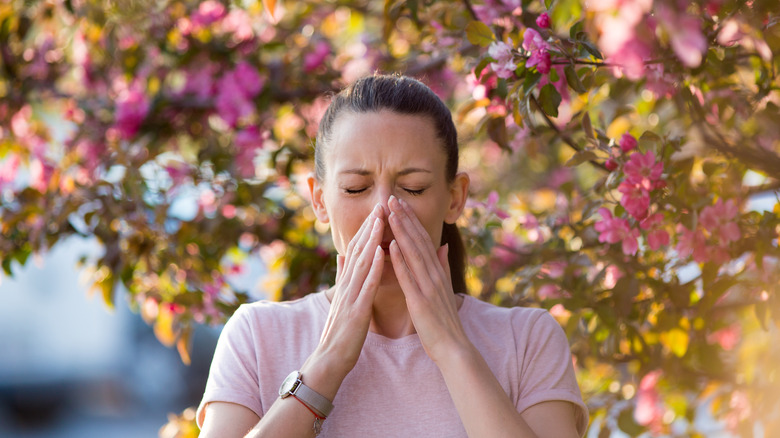Should You Take Benadryl For An Allergic Reaction?
An allergic reaction can be scary. It can be even scarier if it comes on without warning. If you've never dealt with allergies before, you might not know what kind of medication to take to help keep symptoms at bay. Benadryl is one of the most popular antihistamines on the market, so you've probably heard it talked about in relation to allergies before.
Antihistamines work to combat the chemicals in our body that are released when we come across something that we are allergic to (via Benadryl). But depending on the severity of the symptoms you're experiencing, or how allergic you are to something, Benadryl may not be the best option for you. So in what instances should you should seek out a different solution to your allergy woes?
Benadryl comes in many different forms, so depending on your symptoms, there is most likely a Benadryl product for you and your specific needs. Have an itchy bug bite? Try the topical Benadryl cream.
What is an allergic reaction?
You can often differentiate a severe allergic reaction from non-worrisome seasonal allergies by the severity of the symptoms. If you're experiencing symptoms such as an itchy nose or throat, watery eyes, runny nose, or sneezing, Benadryl might be a good option for you to help relieve your symptoms and make you a little more comfortable (via WebMD).
Benadryl can also help treat and relieve hives if you are having a less serious allergic reaction (via Benadryl). The level of response from your body to different allergens can vary from person to person, so the type of medication you use to treat any kind of allergic reaction will depend entirely on how that particular person's body decides to respond. For example, some people have very severe peanut allergies that cause their throat to close up and prevent them from breathing. Others may come in contact with peanuts and start to get a rash or hives. In the more severe cases, Benadryl would probably not work quickly enough to help.
How serious is your allergic reaction?
Although they're both technically allergies, anaphylaxis and an allergic reaction are very different. Anaphylaxis is a fancier word for a life-threatening allergic reaction and should be taken much more seriously than a runny nose and itching. Some common triggers for anaphylaxis include shellfish, tree nuts, peanuts, bee stings, or certain medications (via Mayo Clinic). Some people are aware that they have a severe allergy to some of these things, but others are not. Therefore, it's a good idea to be prepared and know what to do if someone you know experiences anaphylaxis.
Experts at the Mayo Clinic state that symptoms of anaphylaxis include difficulty breathing, throat swelling, dizziness or vomiting, and a weak or rapid pulse. If you're with someone who starts having an allergic reaction such as this, you should call emergency services right away. Severe allergic reactions like this can escalate quickly and can result in death if they are not treated. Some people who have a history of severe allergic reactions may carry an EpiPen with them, which is designed specifically for people who have serious allergies.
Is Benadryl the best thing for you to take?
Although Benadryl can relieve allergy symptoms, in cases of anaphylaxis or severe allergic reactions, it won't work fast enough to help someone having a serious reaction. It's important to be able to recognize the signs of a serious allergic reaction so you're able to help the person experiencing it in the most effective way possible. Again, if you're worried that you or someone you know may be experiencing anaphylaxis, don't take Benadryl and wait to see what happens; you should call 911 immediately (via Mayo Clinic).
If your allergy symptoms aren't in the anaphylaxis category, Benadryl can be a good option for you. Springtime can be a killer for your allergies because of all the pollen in the air. If you find yourself with a runny nose in the spring, Benadryl might help relieve the symptoms you're having. However, Benadryl has been known to cause drowsiness, so if you only have seasonal allergies periodically throughout the year, you may want to opt for a different allergy medication (via Medical News Today). Benadryl is a better option if your allergies are related to insect bites, common colds, or other allergies.




